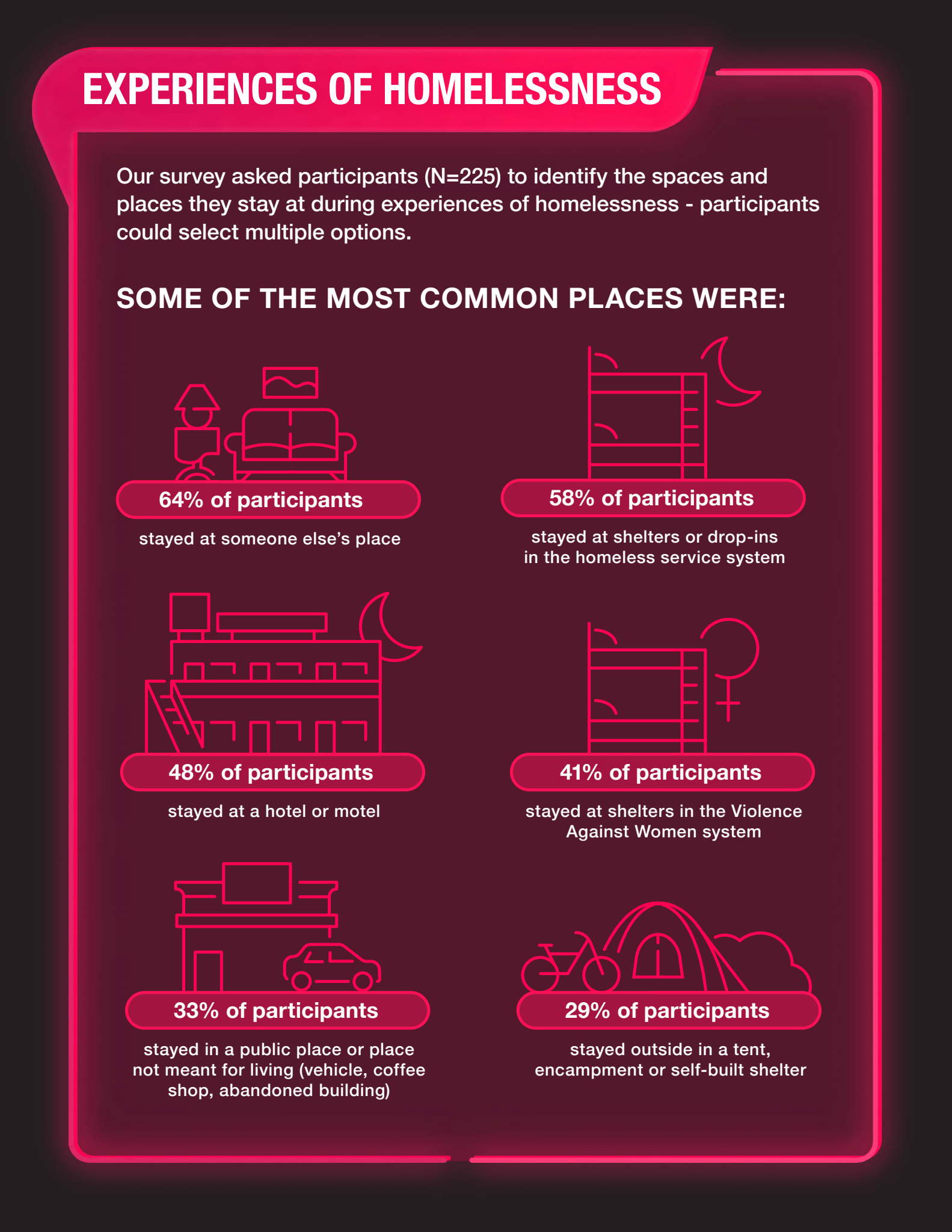Creating Home Together is a project led by Sistering with organizations across Canada. Together, we created a new housing development process that addresses the unique needs of women (cis and trans) and gender-diverse people experiencing homelessness with the goal of improving their lives.
Goals:
We had several long-term and short-term goals that kept us on track throughout this project. The main goal is the desire to create more inclusive, affordable, and suitable housing opportunities for women and gender-diverse people in Canada.
Our Vision:
We identified and created guidelines for what our vision should include. Some of the core elements we decided on were that:
- Our solutions should be people-centred.
- Our solutions should foster a sense of community, home, and ownership.
- Our solutions should be supportive and trauma-informed.
- Our solutions should be low-barrier and inclusive.
- Our solutions should be safe, welcoming, non-judgmental, and feel like home.
Values:
During the project, we asked Lived Expert participants to highlight the elements of a housing development process that were most important to them, and this information guided us throughout the project. Some of these included:
- Non-judgemental.
- Honesty.
- Caring.
- Respect.
- Diversity.
Building Design:
We created five categories that defined an ideal building’s design:
- The Development Process: The prospective participants must be actively involved in every stage of this process, including designing the units.
- Location: Housing should be located in a safe community, and near grocery stores and transit.
- Private Space: Each unit should have a bathroom and kitchen, variety in unit sizes, closet space, and windows and natural light present.
- Indoor Shared Space and Amenities: There should be on-site laundry, space for ceremony, plants, and safe injection sites.
- Outdoor Space and Amenities: Buildings should have community gardens, parking and bike storage, and a green space such as a courtyard.
The Housing Program:
We identified the following three categories that defined programming within the housing:
- Populations served should be inter-generational (all ages), and the eligibility should support a wide range of needs and situations so those in need are able to secure housing.
- Program and Tenure will be considered, with attention given to affordability and access to supports. There will be opportunities for ownership or incorporating a co-op or consensus-based decision-making model. Also, incorporating a social enterprise or tenant hiring model was important.
- Operations suggestions included being pet-friendly, good property management, and safety features, such as 24/7 staffing of the building and extra security.
The Service Model:
The following points were highlighted when describing ideas for the building’s service model:
- There was a spotlight on food and nutrition programming and using food as a means of connecting.
- Social enterprise or opportunities for work.
- Having people use their skill sets in programs within the building.
Support Services and Programming:
A range of services and supports should be offered, such as access to health care, counselling, mental health, and substance abuse supports. On-site programming should bring arts, cooking, and essential life skills to all.
Our Pitch:
We created a draft pitch describing who we are, the reasons to work with us, and we identified that as a collective of low-barrier drop-ins, we have lots to bring to the table.
We explained how we would be involved in each phase of the development process and highlighted the importance of including Lived Experts in the decision-making process. Lived Experts elaborated on the many ways they would like to specifically participate in each stage:
- Early Stages: This phase sets the vision for the project and determines if it will work in multiple ways. Lived Experts felt that they could use their experiences and expertise to shape understanding, inform research, and share a vision for a housing development.
- Pre-Development: This phase is to create a design for the building, gain approval from multiple institutions and secure the funds to build and operate the project. Engagement should allow for Lived Experts to be included. There will be many key decision-making milestones for them to make, including creating guidelines for community engagement and defining who the future residents will be along with the best housing type and model to accommodate them.
- Development: This phase involves constructing the building and selling or renting out the units within. Lived Experts expressed the importance of being informed with updates on the projects through different media, and taking construction site tours. They also expressed interest in being involved in the building design process, making decisions about life skills programming, and keeping the spaces culturally sensitive by having spaces to continue cultural practices.
- Operation: This phase moves the new residents into the project, maintains the project over time, and engages ongoing resident relations. Lived Experts expressed an interest in participating in community building initiatives, such as monthly social and support meetings, organized group outings, and creating a charter of tenant roles and responsibilities, among others.
Roadmap:
We developed a roadmap for future implementation that illustrates the next steps for the short, medium, and long term to create an initial housing development pilot project. We also looked back and reflected on our lessons learned and what the project taught us.
Using what we’ve learnt from our research and the people and organizations we consulted with, we feel that this housing model will be effective and make the lives of women and gender-diverse people better, which in turn will impact their communities in a positive way.

--------
This post is part of our #CAEH22 blog series which highlights research on preventing and ending homelessness that is being presented at the 2022 National Conference on Ending Homelessness, Nov 2-4 in Toronto, ON. Learn more about Aoife and Adrienne’s work through their presentation within the Research Roundup session Friday, November 4th at 10:00 am.

